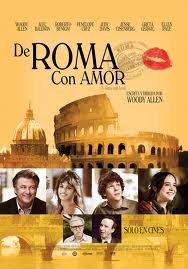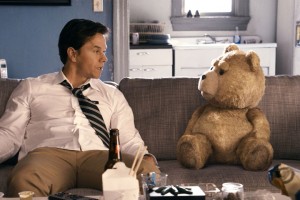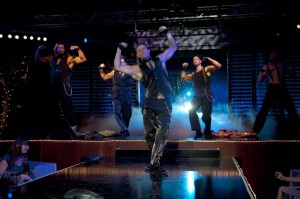 The quality of Woody Allen’s films is incidental, even coincidental. Woody Allen and Adam Sandler may occupy opposite ends of the comedy spectrum when it comes to their audiences and cultural touchstones. Sandler’s touchstones are “I Love the 80’s” faded celebrities and Allen’s are philosophers, New York, and jazz musicians. But they have more in common than their mutual fixations with nostalgia, male characters afflicted with arrested development, and sex. Both, thanks to the enabling devotion of their dedicated audiences, are enabled to make movies that are closer to conceptual art than fully-realized story-telling.
The quality of Woody Allen’s films is incidental, even coincidental. Woody Allen and Adam Sandler may occupy opposite ends of the comedy spectrum when it comes to their audiences and cultural touchstones. Sandler’s touchstones are “I Love the 80’s” faded celebrities and Allen’s are philosophers, New York, and jazz musicians. But they have more in common than their mutual fixations with nostalgia, male characters afflicted with arrested development, and sex. Both, thanks to the enabling devotion of their dedicated audiences, are enabled to make movies that are closer to conceptual art than fully-realized story-telling.
For Allen, who averages a film a year, his real art form is the perpetual production schedule. The prestige factor means that he can get top actors — both in ability and box office appeal to reassure the budget guys — for microscopic fractions of their usual fees. He keeps the same crew. All he has to do is provide a script. But because his priority is getting the film made rather than awards, critical reception, or selling tickets, movies like “To Rome With Love” feel like they came out of the oven without being fully cooked. It plays like a first draft, or even a handful of random notes grabbed at random from a drawer because the cameras were ready to roll.
Allen continues his tour of the capitals of Europe by setting his story in Rome, or, I should say, stories. A stunningly unoriginal opening shows us an Italian traffic cop, who advises us that Rome has many stories. Like an episode of “The Love Boat” he combines four stories, and these are variations on the themes of love, sex, music, aging, and what one character calls “Ozymondian melancholy,” a nostalgic pre-occupation with the past.
A successful architect (Alec Baldwin) confronts a younger version of himself (“The Social Network’s” Jesse Eisinberg), or perhaps himself as a younger man, to try to prevent him from making a disastrous mistake by betraying his lovely, stable, devoted girlfriend (a criminally underused Greta Gerwig) with her high-maintenance friend (a criminally mis-cast Ellen Page, who is supposed to be seductive and neurotic). A naive newlywed couple from the country come to the big city on their honeymoon. As they prepare to meet his very conservative relatives, who have offered him a high-paid job, they get tangled up in deception that includes a fetching prostitute (Penelope Cruz, one of the film’s highlights) and a predatory movie star. An ordinary man (Oscar winner Roberto Benigni) finds himself inexplicably a celebrity, hounded by paparazzi and fans who are fascinated with the most mundane details of his very mundane life. At first, he enjoys the attention and takes advantage of his fame, but then it becomes tiresome. And Allen himself plays a retired opera director who is visiting his daughter (Allison Pill, who was Zelda Fitzgerald in “Midnight in Paris”) and meet her Italian fiancé He discovers that the fiancé’s father, an undertaker, has a magnificent tenor voice, but only in the shower. There is a lot time spent on extraneous conflicts with the Allen character’s wife (Judy Davis) and the lefty politics of the younger couple that never goes anywhere.
There are some very funny lines and some mild humor from the situations, but the best that can be said of it is that just as not much energy was expended in making it, not much will be required to enjoy and then forget it.
(more…)
 In Woody Allen’s new film, To Rome With Love, characters describe an “Ozymandian melancholy.” That is a reference to the poem “Ozymandias” by Percy Bysshe Shelley. It is the story of a man who describes an enormous ancient statue that is all broken and decayed. Hundreds, maybe thousands of years before, an arrogant king had the statue erected to show that his power and fame would never die. But today, he is not even remembered. The “Ozymandian melancholy” refers to the sense that all accomplishment, all happiness, all existence is fleeting. Setting the film in a city that is filled with ancient artifacts underscores this theme.
In Woody Allen’s new film, To Rome With Love, characters describe an “Ozymandian melancholy.” That is a reference to the poem “Ozymandias” by Percy Bysshe Shelley. It is the story of a man who describes an enormous ancient statue that is all broken and decayed. Hundreds, maybe thousands of years before, an arrogant king had the statue erected to show that his power and fame would never die. But today, he is not even remembered. The “Ozymandian melancholy” refers to the sense that all accomplishment, all happiness, all existence is fleeting. Setting the film in a city that is filled with ancient artifacts underscores this theme.



